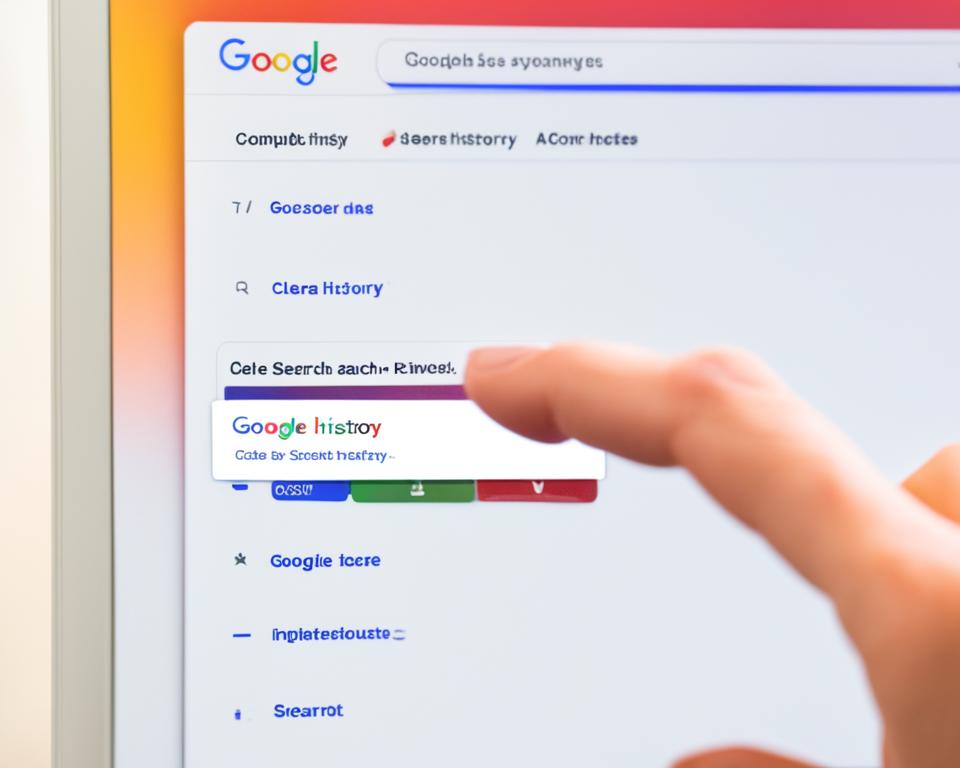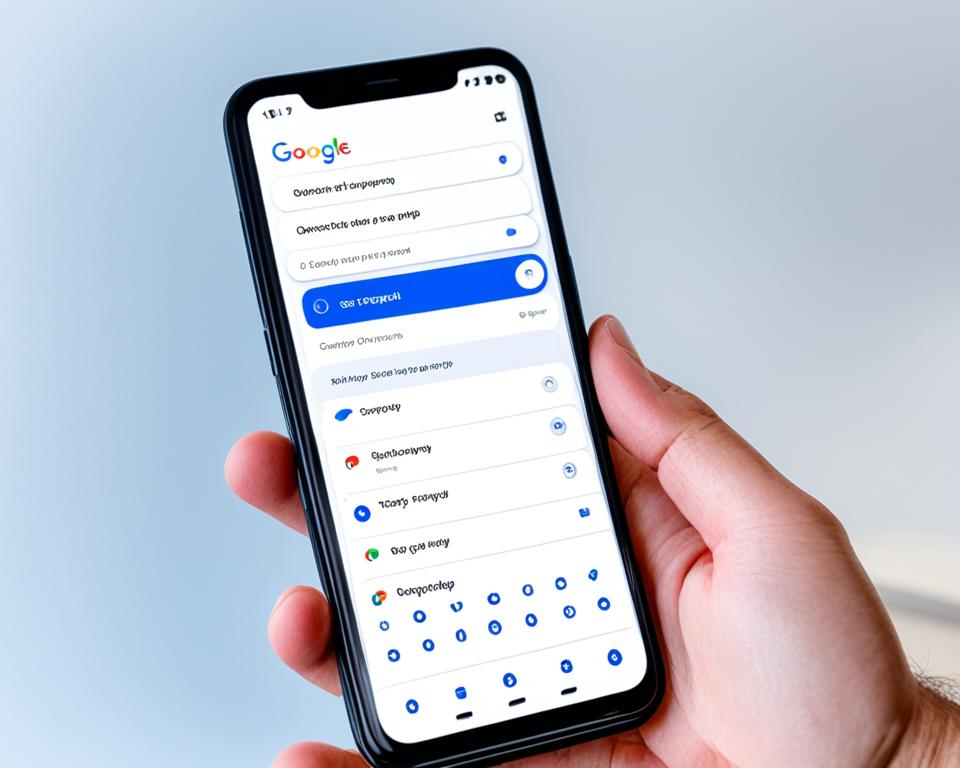
Clear Google Web Search History: Quick Steps
Want to keep your online life private? It’s key to know how to clear google web search history. This includes how to clean google search history or manage google search history. If you’re worried about your digital footprint, it’s crucial to learn how to delete google search history, remove search history from google, or erase google search history completely. Sometimes, it might look tough to can’t clear browser history, but there’s always a solution.
We’ll show you how to quickly wipe google search history and keep it clean regularly. If you’re Not okay with your photo searches staying online, knowing how to clear google photos search history is comforting. Browsing should be easy and private. That’s why knowing how to chrome turn off history and finding the clear history tab matters. If you’re wondering how to cancel history, you’re not alone. We’re here to assist.
Key Takeaways
- Understanding how to manage and clear your Google search history is vital for maintaining online privacy.
- Knowing the tools to delete, erase, and wipe your history can empower you to control your digital footprint.
- Troubleshoot issues when browsers do not allow you to clear history, ensuring your privacy is safeguarded.
- Learn to navigate privacy features like the clear history tab and options to turn off history in Chrome.
- By following clear and simple steps, canceling your history entries and cleaning your Google Photos search history is straightforward.
Understanding Your Google Web Search History
Learning how you’re tracked online can be surprising. When you search the web, understanding google web search history helps keep your privacy. Google is the top search engine and gathers data to make things better for you. But, this also means it watches and keeps track of what you do online.
What Does Google History Track?
Many wonder, “what does google track?”. Google follows many things each time you search. It notes your search words, when you search, the links you click, and where you’re searching from. This data makes a profile to better customize what you see and ads that match your interests.
The Impact of Syncing Across Devices
Being able to reach your data on all your devices is handy. Yet, syncing your Google search history can affect your privacy. If you’re logged into Google, your searches and other browser data sync up. They do this across your phone, tablet, and computer. It’s handy but lets Google learn more about you.
It’s key today to know how your data is used and shared. Understanding how your info is gathered and used across devices helps you manage your online life.
Reasons to Delete Your Search History
Have you ever wondered: Why clear Google search history? This is important for keeping a balance between ease and privacy. A key reason to delete search history is to protect your private info from outsiders.
Worries about search history privacy are real. Search engines remember your searches and visits, creating a detailed profile of you. This might be concerning. Yet, the benefits of deleting search history go beyond keeping privacy. It also stops the sharing of your search habits or ad profiles on shared devices.
- Clearing history helps prevent personalized ad targeting based on your search behavior
- Deleting search history reduces the risk of sensitive data being exposed if your account is ever breached
- Regularly wiping search history can improve browser performance by clearing cached data
Why clear Google search history? It’s about keeping control over your online presence and avoiding personal data misuse. Deleting your history regularly helps keep your digital privacy and security tight.
“Your data is your digital identity. Protect it with the same zeal as you would protect your physical self.”
In short, there are many reasons to delete search history, from keeping your privacy to helping your device run better. Knowing these reasons helps users manage their online presence and digital footprint.
Navigating Chrome’s History Page
Looking through your browser’s history is like taking a trip through your digital life. It’s useful whether you’re trying to find a site you visited or keeping your browsing private. This guide will help you easily access and manage your Chrome history. You’ll learn how to find pages in your history, keeping control of your online trail.
How to Access Your History
Getting to your Chrome history is easy. Just a few clicks and you’re there. Start by opening Chrome. Look for the three vertical dots in the top right corner. Clicking here opens a menu. Find the ‘History’ option. It opens another menu. This shows recent tabs and a ‘History’ link at the top. Clicking takes you to your search history and sites you’ve visited.
Finding Specific Pages in Your History
Looking for specific pages in your history can seem hard. But, Chrome makes it easier with a search function. There’s a search bar at the top of the history page. Type in keywords for the page you need. Chrome will sort through your history and show you matching results. This makes managing your history straightforward and less time-consuming.
Step-by-Step Guide to Clear Google Web Search History
It’s crucial to manage your digital footprint for privacy. Our step-by-step guide to clear google search history makes it easy.
If you use a shared computer or value your privacy, removing your Google search history is simple. We’ll show you how to delete your search history in easy steps.
- Open your preferred web browser and sign in to your Google Account, if you’re not already logged in.
- Head over to the History section by clicking on the Google Account icon and selecting Manage your Google Account followed by the Privacy & personalization option.
- Within this panel, navigate to My Activity to access your activity across Google services, including your web search history.
- Here you’ll find an abundance of activity controls. To zero in on your web searches, tap on the Web & App Activity section.
- If you want to erase your entire browsing history, you can click on Delete activity by on the left pane, choose the desired time frame, and press Delete.
- For a more granular approach, simply scroll through your activity list, and use the More button (usually indicated by three vertical dots) next to each entry to delete individual search items.
Deleting your Google web search history declutters search suggestions and enhances privacy. You can clear your search history as needed, making it a user-friendly process.
Pro Tip: Regularly clearing your Google search history helps protect sensitive information and minimizes the risk of unwanted data accumulation over time.
By actively deleting your digital records, you protect your privacy and encourage responsible internet use.

For those extra concerned about privacy, consider using incognito mode or privacy-focused search engines. Managing your online presence means more than just removing search history on google. It’s about engaging with the internet wisely.
Our guide simplifies the process, making privacy protection easy and worry-free.
How to Remove Individual Items from Your Search History
Sometimes, you only want to delete certain things from your search history. This could be to tidy up your digital tracks or keep some searches private. We’ll show you how to remove single entries from your search history and give you tips for finding specific entries.
Deleting Single Entries
Getting rid of single items from your search starts with just a few clicks. To find out how to delete single entries from search history, first, go to your browser’s history section. Scan through the sites and searches you’ve made. Once you find what you want to delete, hover over it. Look for the option to delete or remove it. Click confirm, and it’s gone. This boosts your privacy and leaves the rest of your history untouched.
Tips for Searching Individual Entries
If finding a specific entry is hard, or your history is long, tips for searching specific entries in history are very helpful. Most browsers have a search feature in the history section. You can use keywords or dates to narrow down results. This makes finding and managing your search history easier. Regularly checking your search history helps keep your online footprint small and your private info safe.
In conclusion, we’ve looked at how to remove individual items from search history and given tips on how to delete single entries from search history. It’s important to be proactive about managing individual search history entries. This helps keep your online presence under your control.
Organize Your History with Group Tabs
Web users today want to be efficient and well-organized online. Organizing search history with group tabs is a leading way to manage online data. It makes workflows simpler and allows for personal content curation, meeting the demands for customized digital experiences.
What Are Group Tabs?
Group tabs are great for people who like grouping search history entries. They let you put related tabs together under a single label. This helps stay organized and keep track of projects or interests. It makes navigating easier, without the mess of too many open tabs.
Barbara Krasnoff’s guide explains how to set up group tabs. Check it out at what are group tabs in search history. Samar Haddad adds helpful illustrations to make the instructions clear.
Managing Your History in Groups
For effective management of history through group tabs, users must meet specific conditions. These are imperative for the system’s success.
- All users must be located in the US and at least 18 years old.
- Users are required to be signed in to their Google Account.
- Enabling Sync features is necessary to ensure proper syncing of their History.
- Users need to activate Chrome’s Experimental AI features for an enhanced experience.
- The tool allows viewing only one suggested group at a time, streamlining focus.
When managing search history in groups, data like page titles and URLs are collected. This data helps improve safety and tackle large language model complexities. Google ensures a thorough review of this data to maintain Chrome’s Tab organizer integrity. This practice is in line with Google’s and Generative AI’s Terms of Service.
Google focuses on empowering users with group tabs. If you need help or more info, the managing search history in groups support page is a great resource. It’s perfect for enhancing your online search skills.
Using Incognito Mode for Privacy
Many people use incognito mode to keep their internet searches private. This has gained attention, especially after a recent legal case with Google. The case shows that we need to really understand what private browsing with incognito mode can and cannot do. It’s a wake-up call about the data that can still be tracked.
Turning on incognito mode is simple, but its real benefits are often misunderstood. By using it, your browsing history, cookies, and form inputs aren’t saved on your device. This offers a basic level of privacy during your internet sessions.
However, incognito mode’s ability to keep you private is limited. Websites and third parties can still track your visits even in this mode. Not everyone knows this. The recent Google settlement shows a push for more openness about privacy. It reveals some issues, even Google workers were worried about these tracking issues.
Users should be well-informed about the limitations of incognito mode, and that it’s not a one-stop solution for online privacy. – A key takeaway from the disclosed internal emails within Google.
- Google will remove vast amounts of incognito browsing data.
- The controversy stemmed from users believing their incognito activity was completely private.
- Tens of millions of users will see changes in how Google communicates the scope of incognito mode.
The legal case with Google reminds us to keep asking questions about online privacy. While incognito mode helps hide some activities, it’s not enough by itself. We need to use other tools for better privacy protection.
Alternatives to Google for Enhanced Privacy
Many internet users now look for alternatives to Google for privacy. They worry about their data safety. Luckily, some new search engines offer strong privacy controls. These help people protect their online presence.
Different Search Engines to Consider
Private search engine options like DuckDuckGo are getting popular. They don’t save your search history or personal data. This means you get private search results. A visit to DuckDuckGo will show how it protects your privacy without compromising search quality.

Brave Search is another great choice for privacy. It operates on 100% independence. It ensures privacy through the Brave Web Discovery Project. This makes it a top option for those who value privacy highly.
Swisscows is ideal for a family-friendly search. It deletes all search data in just seven days. Swisscows focuses on privacy and safety. It’s suitable for users of all ages.
Ecosia is perfect for those who care about the environment. It plants trees using its ad revenue. Every search you make with Ecosia helps the planet get greener.
Bing might interest those used to Microsoft’s services. It’s not focused on privacy. But, you can earn points for rewards with every search. These can be used for gifts, sweepstakes, or donations.
Turning Off Activity Tracking
Choosing a private search engine is a great start. But, turning off activity tracking boosts your privacy. It stops companies from building a digital profile of you. You can disable tracking in your browser’s settings. This reduces your digital trail significantly.
Trying out these Google alternatives can better protect your data. You can pick private search engine options that match your privacy preferences. This helps in keeping your personal information safe.
Securing Your Mobile Browsing
With mobile internet getting more popular, securing mobile browsing is crucial. Smartphones are handy but can make us forget about privacy. By improving how you manage your online activity, you can keep your personal info safe. It’s important to clear search history on Android and manage history on iOS devices.
Clearing History on Android Devices
For Android users, keeping browsing private is easy. Make sure to clear search history on Android often. This hides your online activities. It’s especially useful on shared or public devices.
- Open the Chrome app on your device.
- Tap on the three dots menu icon for more options.
- Select ‘History’ and then ‘Clear browsing data.’
- Choose the time range and types of data you wish to delete.
- Confirm by tapping ‘Clear data.’
Managing History on iOS Devices
Apple’s iOS devices have strong privacy features. Controlling your Safari search history is key to keeping your browsing info private. This stops too much data from gathering.
- Access Safari and click on the bookmark icon.
- Navigate to the ‘History’ tab.
- Tap ‘Clear’ at the bottom to remove your browsing history.
- Select the time range for which you wish to clear the history.
Using privacy features on Androids and iPhones boosts your online safety. It also makes your device work better. Plus, it fights against targeted ads and shrinks your digital footprint.
Conclusion
Our final thoughts focus on important steps to protect your online presence. A shocking 71% don’t know that clearing browsing history doesn’t fully erase it. Thus, the need for better online habits is clear. 82% often accept cookie pop-ups without thinking. And 76% allow cookies without knowing the consequences. Sadly, 62% think cookies and cache improve their internet use. We aimed to correct these wrong beliefs and suggest helpful actions.
Many people misunderstand online privacy—49% believe clearing cookies protects their data. Also, 64% think incognito mode hides them online. But 89% don’t fully understand that incognito mode isn’t a privacy shield. Concerns grow as 44% worry that too much stored data slows down devices. Plus, 67% don’t know data stays after deletion. And 53% don’t realize the risk in just deleting their history. This shows we must improve our digital cleanliness skills.
There is hope, though. 73% want to learn the right way to delete browsing history on different browsers. We aimed to provide this knowledge. By understanding our advice and following the steps we laid out, readers can be more secure online. The knowledge and habits you adopt are key to protecting your digital life.
FAQ
How can I clear my Google web search history?
To clear your Google web search history, here’s what you do:
1. Open your Google account settings.
2. Go to “Data & Personalization.”
3. Find the “Activity and timeline” section.
4. Click “My Activity.”
5. On the left, click “Delete activity by.”
6. Pick a time to delete, like “Last hour” or “All time.”
7. Hit “Delete.”
What information does Google track in my search history?
Google tracks a lot in your search history. This includes:
– The terms you search for
– Websites you visit from those searches
– YouTube videos you watch
– Ads you click on
– Voice and audio stuff
– Your location history
– Info about your device
How does syncing my search history across devices affect my privacy?
Syncing your search history affects privacy like this:
– It makes your searches available on all devices using your Google account.
– Google uses this info to customize your search results and ads.
– If someone else gets your device, they might see your search history.
Why should I delete my search history?
Here’s why you might delete your search history:
– To keep your personal info private.
– To stop getting ads based on your searches.
– To avoid embarrassing situations.
– To free up space on your device or Google account.
How can I access and manage my search history in Chrome?
Accessing and managing your Chrome search history is easy:
1. Open Chrome and click the three-dot menu.
2. Choose “History.”
3. Use the search bar or scroll to find pages.
4. To delete a page, click the three-dot menu next to it and choose “Remove from history.”
How do I delete individual items from my search history?
For deleting individual search items, follow these:
1. Go to your Google account settings.
2. Click “Data & Personalization.”
3. In “Activity and timeline,” click “My Activity.”
5. Find the item, click the three-dot menu beside it, and hit “Delete.”
What are group tabs and how can I use them to organize my search history?
Group tabs help organize searches into collections. Here’s how:
1. Open Chrome history and select pages to group.
2. Click the three-dot menu and choose “Save as group.”
3. Name your group. Access it anytime from Chrome history.
How can I browse the web privately using Incognito mode?
To use Incognito mode for private browsing:
– Click the three-dot menu in Chrome.
– Pick “New incognito window.”
– A new window shows you’re in Incognito mode.
– Searches and browsing here won’t be saved.
Are there alternatives to Google that prioritize user privacy?
Yes, alternatives like DuckDuckGo and Startpage focus on privacy. They don’t track or store your search history. They offer anonymous searches.
How can I clear my search history on mobile devices?
To clear history on Android:
– Open Chrome.
– Tap the three-dot menu and go to “History.”
– Tap “Clear browsing data.” Choose what to clear, then “Clear data.”
For clearing on iOS:
– Open Safari.
– Tap the bookmark icon, then “History.”
– Tap “Clear” and pick a time range.
– Hit “Clear History.”














